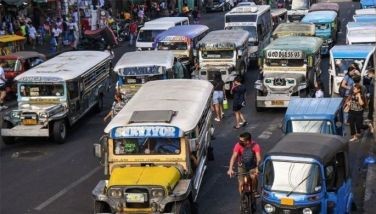1 M liters of av-gas escape from pipeline
May 20, 2002 | 12:00am
FLORIDABLANCA, Pampanga — A portion of the 42.5-mile pressurized fuel pipeline from Subic to Clark burst after being hit by a lahar sand quarrying equipment here Saturday afternoon, releasing an estimated one million liters of aviation fuel and causing massive pollution in populated areas and farmlands in two barangays.
The US military installed the pipeline to pump fuel to and from its former bases at Subic Bay and Clark Field, but was left in disrepair after the Americans pulled out in the aftermath of the Mt. Pinatubo eruption in 1991.
Sources from this town said the fuel spillage lasted two to three hours after a portion of the pipeline in Barangay Consuelo was damaged by a tractor quarrying lahar sand in a prohibited area.
The quarrying operator was identified as a woman closely linked to a highly placed police official based at Camp Olivas in San Fernando City.
Toxic waste disposal expert Joey Marfori, one of those asked by the Armed Forces to rehabilitate the pipeline after the US military left, estimated that about one million liters of fuel might have leaked out.
"That pipeline pumps as much as 3.2 million liters of fuel to the Diosdado Macapagal International Airport in Clark," he said.
Officials of the Subic-based Coastal Corp., which operates the fuel pipeline, corroborated Marfori’s estimate, according to Rey Garcia, information officer of the Subic Bay Metropolitan Authority.
Garcia said the spillage was contained at about 9 p.m. Saturday. Reports said the spilled fuel reached about two feet thick in some portions of Barangays Consuelo and Carmencita.
Marfori described the pipeline as multi-product, which means it can be used to pump assorted kinds of fuel, including the highly flammable aviation fuel.
Reports said residents of the two affected communities collected the fuel in huge containers. "It was an explosive situation. It was fortunate that the fuel was not ignited because the extent of damage would have been tremendous," Marfori said.
Had the fuel been ignited, Marfori said the devastation could have approximated the tragedy in Guadalajara, Mexico in April 1990 that killed 200 people and injured 2,000 others.
"I’ve always stressed that the pipeline needs protective systems such as sectionalized pumps so that leaks could be stopped immediately," Marfori said.
He also cited the need to secure the entire length of the pipeline from sabotage.
Marfori recalled that when he was asked to repair the pipeline after the Americans left Clark and Subic, cows who ate contaminated grass instantly died.
He said the pipeline runs through the Gumain River in this town and the Porac River in Porac town. "These are very dangerous points since lahar flows could damage the pipe," he said.
"The problem is that while the pipeline is now being commercially operated, the US military has refused to give details on its exact design," Marfori said.
The US military installed the pipeline to pump fuel to and from its former bases at Subic Bay and Clark Field, but was left in disrepair after the Americans pulled out in the aftermath of the Mt. Pinatubo eruption in 1991.
Sources from this town said the fuel spillage lasted two to three hours after a portion of the pipeline in Barangay Consuelo was damaged by a tractor quarrying lahar sand in a prohibited area.
The quarrying operator was identified as a woman closely linked to a highly placed police official based at Camp Olivas in San Fernando City.
Toxic waste disposal expert Joey Marfori, one of those asked by the Armed Forces to rehabilitate the pipeline after the US military left, estimated that about one million liters of fuel might have leaked out.
"That pipeline pumps as much as 3.2 million liters of fuel to the Diosdado Macapagal International Airport in Clark," he said.
Officials of the Subic-based Coastal Corp., which operates the fuel pipeline, corroborated Marfori’s estimate, according to Rey Garcia, information officer of the Subic Bay Metropolitan Authority.
Garcia said the spillage was contained at about 9 p.m. Saturday. Reports said the spilled fuel reached about two feet thick in some portions of Barangays Consuelo and Carmencita.
Marfori described the pipeline as multi-product, which means it can be used to pump assorted kinds of fuel, including the highly flammable aviation fuel.
Reports said residents of the two affected communities collected the fuel in huge containers. "It was an explosive situation. It was fortunate that the fuel was not ignited because the extent of damage would have been tremendous," Marfori said.
Had the fuel been ignited, Marfori said the devastation could have approximated the tragedy in Guadalajara, Mexico in April 1990 that killed 200 people and injured 2,000 others.
"I’ve always stressed that the pipeline needs protective systems such as sectionalized pumps so that leaks could be stopped immediately," Marfori said.
He also cited the need to secure the entire length of the pipeline from sabotage.
Marfori recalled that when he was asked to repair the pipeline after the Americans left Clark and Subic, cows who ate contaminated grass instantly died.
He said the pipeline runs through the Gumain River in this town and the Porac River in Porac town. "These are very dangerous points since lahar flows could damage the pipe," he said.
"The problem is that while the pipeline is now being commercially operated, the US military has refused to give details on its exact design," Marfori said.
BrandSpace Articles
<
>
- Latest
- Trending
Trending
Latest
Trending
Latest
Recommended





























